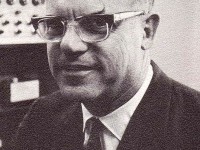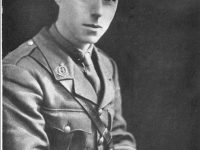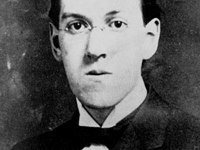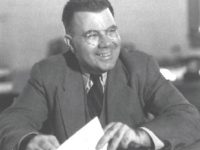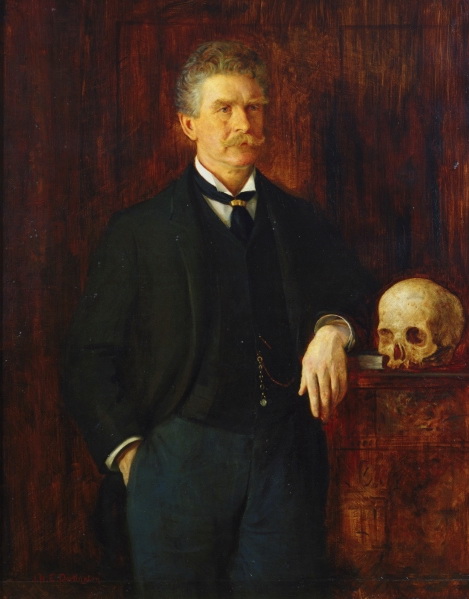
Ambrose Bierce (1842 – 1913)
Author, journalist, satirist, and critic Ambrose Gwinnett Bierce was born on June 24, 1842. He had a great influence in the literature of the 20th century through his works, most of them dealing with the American Civil War. A prolific and versatile writer, Bierce was regarded as one of the most influential journalists in the United States.
“Happiness, n. An agreeable sensation arising from contemplating the misery of another.”
— The Devil’s Dictionary, Ambrose Bierce, 1911
Recruited for the American Civil War
At the age of 18, Bierce was recruited to the ‘9th Indiana Infantry Regiment’ of the Union Army. Honored for his courage and later promoted to being a topographical engineer, Bierce built up a reputation in these difficult times. But with his growing influence in the Civil War, it started affecting his mind and therefore his works. One of the most incisive events in Bierce’s military career turned out to be the Battle of Kennesaw Mountain, which was later known for its immense cruelty. Ambrose Bierce was heavily wounded and dealt with this traumatic experience in later works, such as ‘What I saw of Shiloh‘ and many short stories. An Occurrence at Owl Creek Bridge belongs to Bierce’s best known works and was published in 1890. The story is set up during the Civil War, the protagonist and Confederate supporter Peyton Farquhar blunders into a trap and gets caught in the act while trying to sabotage a bridge. Farquhar is sentenced to death, still the reader is left with the illusion he had survived his hanging until the end of the story (definitely a ‘must read’ if you haven’t already…). The short story is an example of the gap between narrated time and narrative time, since it covers the few seconds of a hanged person between the fall and the broken neck.
A Career as Reporter
After the war, Bierce began his career as a columnist, and editor. His satirical writings and his motto ‘nothing matters’ caused his widely known nickname ‘Bitter Bierce‘. His book The Devil’s Dictionary only contributed to this reputation. It contains many ironic definitions of common English words and was published in 1906, originally titled ‘The Cynic’s Word Book‘.
“Logic, n. The art of thinking and reasoning in strict accordance with the limitations and incapacities of the human misunderstanding. The basic of logic is the syllogism, consisting of a major and a minor premise and a conclusion – thus:
Major Premise: Sixty men can do a piece of work sixty times as quickly as one man.
Minor Premise: One man can dig a post-hole in sixty seconds; Therefore-
Conclusion: Sixty men can dig a post-hole in one second.This may be called syllogism arithmetical, in which, by combining logic and mathematics, we obtain a double certainty and are twice blessed.”
— The Devil’s Dictionary, Ambrose Bierce, 1911
Surveyor in India
Bierce participated in an expedition through Indian territory in 1866 as a surveyor. He then became a journalist at the San Francisco Examiner and soon became a nationally influential correspondent for the Hearst press group, first in London (UK) and then in Washington, D.C..
His Last Journey
At the age of 71, Bierce left for a tour of his battlefields during the Civil War, unfortunately this was his last journey. In Mexico he was going to witness the Mexican Revolution and was never to be seen again after the turn of the year 1913/1914. His last letter received suggests that Bierce was expecting him to be legally executed at the time. All investigations failed and many myths concerning his death have developed during the years. Carlos Fuentes‘s novel ‘The Old Gringo’ is a fictionalized account of Bierce’s disappearance, which was later adapted into the film ‘Old Gringo‘ (1989), starring Gregory Peck in the title role.
The Wickedest Man of San Francisco
Bierce was rather controversial as a human being. Some contemporaries called him an enemy of man (“the wickedest man of San Francisco“), others praised his kindness and helpfulness. His private life in mature age was overshadowed by severe asthma, the death of both sons, a failed marriage and alcohol problems. Even though Bierce and Edgar Allen Poe are regarded today as pioneers of the macabre short story and some narratives can be found in anthologies, a large part of his oeuvre has only been received extremely selectively.[6] In addition to his rather popular, sarcastically black and humorous collection of aphorisms, The Devil’s Dictionary, the recognition is based primarily on two anthologies: Tales of Soldiers and Civilians at 26, and Can Such Things Be? with 25 short stories.
A Witty Cynic and Observer
As an expert in day-to-day political business, Bierce had a very bad opinion of the profession of politician and became a pointedly witty cynic and observer. During his lifetime, however, he was largely ignored as a writer. This only changed after the Second World War. Today, some of his exemplary short stories serve as textbook reading. Like Edgar Allan Poe and later H. P. Lovecraft, Bierce shaped modern horror literature with his often drastic and macabre stories.[5]
Introduction to Ambrose Bierce, [7]
References and Further Reading:
- [1] The Devil’s Dictionary, Ambrose Bierce
- [2] Ambrose Bierce at American Literature
- [3] Ambrose Bierce at the Poetry Foundation
- [4] Ambrose Bierce at Wikidata
- [5] H.P. Lovecraft and the Inconceivable Terror, SciHi Blog
- [6] The Mysterious Death of Edgar Allan Poe, SciHi Blog
- [7] Introduction to Ambrose Bierce, Aileen Farrar @ youtube
- [8] Beam, Alex (June 24, 2008). “Ambrose Bierce, mon amour”. The Boston Globe.
- [9] S. T. Joshi and David E. Schultz, Ambrose Bierce: An Annotated Bibliography of Primary Sources, Westport, CT and London: Greenwood Press
- [10] Nickell, Joseph ‘Joe’ (1992). Ambrose Bierce Is Missing and Other Historical Mysteries.
- [11] O’Connor, Richard (1967). Ambrose Bierce: a Biography, with illustrations, Boston, Little, Brown and Company.
- [12] The Works of and about Ambrose Bierce, via Wikisource

